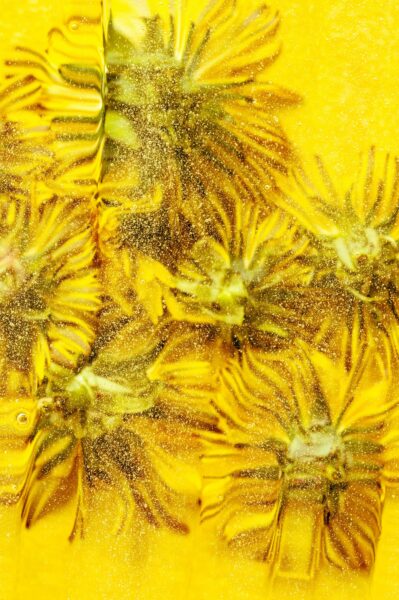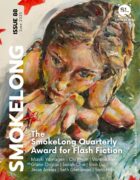I.
The rain doesn’t smell the same here, and neither do I.
Warm, resinous, alive: piñons and junipers, greasewood and ponderosa, the ghost bloom of Apache plume snagged on old barbed wire, claret cup cactus blooming scarlet against broken stone—plants whose names I had to borrow from strangers. These smells have no words in my body; they arrive like teeth or tides or prayers from other shores.
Sun encapsulated in tree limbs like fruit. A whip crackle of thunder behind the tongue. A bluebird’s tail, stitched with rain. An approximation of the landscape that surrounds me.
But this, still, is only my unwieldy translation. The memories I retrieve in these chemical maps are different from the ones you do. I think this was always the thing between us—the different places, the different planes of existence. The words I gave you were only so much mine until they touched your skin and bloomed into something I never meant.
The rain here in the Sangre de Cristos doesn’t smell like the rain back home in Japan. There, it was rice fields sighing open after winter’s dry hold. Here, it is the green mineral breath of the earth unlatching itself from the dust, feral and thick. The foothills fall into arroyos braided with willow and sand.
I remember telling you this once. You kissed my hair and said, rain is rain is rain. I smiled, but it fell short inside my mouth. I remember wishing you could smell the difference.
II.
The chamisa bloomed wild that year, taller than the mailbox, spilling gold over the broken fence and the bar ditch and the edges of the gravel road. The desert smelled like rain caught inside a log. A yellow riot across the hills, heavy, almost too much for the air to hold.
I cupped a blossom in my hands and breathed in deep, half-laughing, half-drowning.
“This,” I said, my mouth full of it, “this almost smells like home. Not the same. But almost. When the rengyō start to open everywhere. Like…”
I tried to find the words. You sniffed the chamisa, made a face.
“Pollen…and dirt,” you said.
I didn’t know how to tell you that in the spring, my mother used to scrub the tatami mats with orange rinds and vinegar, how it made the whole house smell like florescence and sap, how the rain would open the city like a peeled fruit. I used to trail after her, hands pressing the clean linen flat against the floor, feet kicking up behind me.
Instead, I crushed the chamisa harder between my palms until the smell stained my hands. You kissed my wrists and laughed. I wanted to ask: do you smell it now?
Memory leaks through scent, through skin.
You sneezed.
I tucked the gold branch behind your ear anyway, watched the yellow dust crumble onto your shoulders, bright and scattered.
I tried to think—maybe you already smell like my old apartment and my mother’s voice and the October sky bending down over the Sagami River, but in a language I don’t understand yet.
Later, I found the branch adorning your dashboard, flowers shriveled in the magnified sun through glass, petals curled like half-open fists across the dark leather.
III.
Still, I showed you the slow exhale of ponderosa resin in summer, the way crows rattle when the air shifts, the dark musk of rain gathering under stone. The way the jackrabbits went still when the arroyo filled with water, just before dusk.
I learned to love your tilted head when you tried to listen. Your furrowed brow, trying to map my weather to your maps.
You’d ask: “So, it smells like rain?”
And I’d say, “Yes, but also no. But yes.”
We’d laugh. So I tried, too, to learn your language.
How you named the weather by road conditions. How you talked about the world in altitudes and tire pressure and house keys misplaced in jacket pockets.
How a certain kind of silence, when you sat fixing the broken lamp, meant: stay close, don’t ask yet.
How a breath drawn sharp through your teeth meant: I’m afraid if I say this wrong, you’ll disappear.
You built those bookshelves even after work kept you late. You cooked eggs on mornings you didn’t even want breakfast. Eventually, you remembered the names of every bird I pointed out, even if you mixed them up later: jays, ravens, black-throated sparrows, the desert wren.
I learned the smell of solder when you fixed the broken radio. And the burnt cotton of your old hoodie after you singed it welding an old pipe.
And the way you pointed, that evening we saw a kestrel hover, legs dangling above the road, shadow trembling on the cracked asphalt.
My metaphors didn’t always survive the crossing and your measurements didn’t always fit inside my hands.
Even so, I opened the door when you knocked.
You caught my sleeve when I turned away.
IV.
Some nights, your fingers still brush mine in the dark, hesitant and sure at once, stubborn.
Some mornings, the earth splits with green after rain, yucca spears stabbing skyward, claret cups once again bleeding red between the rocks, so sudden it looks almost painful.
We stumble through the mist, hands outstretched.
In the stillness after rain, in the clumsiness of your touch, in the smell of creosote rising and your hand finding mine, there is the scent of resin and minerals and crushed green, and somewhere underneath it, the slow heartbeat of rivers halfway around the globe and storms still unborn.
I breathe it in. I turn toward you. The clouds unfurl across the Chama Valley like smoke-wool and we reach, and reach, and reach.
I wonder what I smell like to you now.
_____________________________
“Between Chamisa and Rengyō” is the first-place winner of The SmokeLong Quarterly Award for Flash Fiction 2025.



 The core workshop of SmokeLong Fitness is all in writing, so you can take part from anywhere at anytime. We are excited about creating a supportive, consistent and structured environment for flash writers to work on their craft in a community. We are thrilled and proud to say that our workshop participants have won, placed, or been listed in every major flash competition. Community works.
The core workshop of SmokeLong Fitness is all in writing, so you can take part from anywhere at anytime. We are excited about creating a supportive, consistent and structured environment for flash writers to work on their craft in a community. We are thrilled and proud to say that our workshop participants have won, placed, or been listed in every major flash competition. Community works.